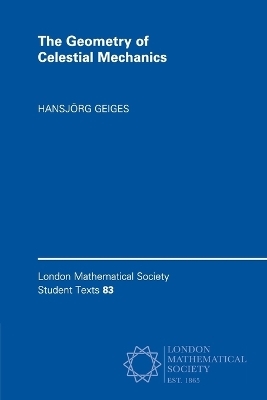
The Geometry of Celestial Mechanics
Seiten
2016
Cambridge University Press (Verlag)
978-1-107-56480-0 (ISBN)
Cambridge University Press (Verlag)
978-1-107-56480-0 (ISBN)
A geometric introduction to celestial mechanics, for advanced undergraduate and beginning graduate students. This textbook introduces the geometric concepts underlying celestial mechanics and their applications, making it suitable for traditional geometry courses or as supplementary material. Numerous exercises and extensive historical notes also support self-study.
Celestial mechanics is the branch of mathematical astronomy devoted to studying the motions of celestial bodies subject to the Newtonian law of gravitation. This mathematical introductory textbook reveals that even the most basic question in celestial mechanics, the Kepler problem, leads to a cornucopia of geometric concepts: conformal and projective transformations, spherical and hyperbolic geometry, notions of curvature, and the topology of geodesic flows. For advanced undergraduate and beginning graduate students, this book explores the geometric concepts underlying celestial mechanics and is an ideal companion for introductory courses. The focus on the history of geometric ideas makes it perfect supplementary reading for students in elementary geometry and topology. Numerous exercises, historical notes and an extensive bibliography provide all the contextual information required to gain a solid grounding in celestial mechanics.
Celestial mechanics is the branch of mathematical astronomy devoted to studying the motions of celestial bodies subject to the Newtonian law of gravitation. This mathematical introductory textbook reveals that even the most basic question in celestial mechanics, the Kepler problem, leads to a cornucopia of geometric concepts: conformal and projective transformations, spherical and hyperbolic geometry, notions of curvature, and the topology of geodesic flows. For advanced undergraduate and beginning graduate students, this book explores the geometric concepts underlying celestial mechanics and is an ideal companion for introductory courses. The focus on the history of geometric ideas makes it perfect supplementary reading for students in elementary geometry and topology. Numerous exercises, historical notes and an extensive bibliography provide all the contextual information required to gain a solid grounding in celestial mechanics.
Hansjörg Geiges is Professor of Mathematics at the University of Cologne. He has received several teaching awards, and an EMS prize for mathematical exposition. His book An Introduction to Contact Topology (Cambridge, 2008), has become a highly cited standard reference for the field.
Preface; 1. The central force problem; 2. Conic sections; 3. The Kepler problem; 4. The dynamics of the Kepler problem; 5. The two-body problem; 6. The n-body problem; 7. The three-body problem; 8. The differential geometry of the Kepler problem; 9. Hamiltonian mechanics; 10. The topology of the Kepler problem; Bibliography; Index.
| Erscheinungsdatum | 31.03.2016 |
|---|---|
| Reihe/Serie | London Mathematical Society Student Texts |
| Zusatzinfo | Worked examples or Exercises; 39 Line drawings, unspecified |
| Verlagsort | Cambridge |
| Sprache | englisch |
| Maße | 153 x 231 mm |
| Gewicht | 350 g |
| Themenwelt | Mathematik / Informatik ► Mathematik ► Analysis |
| Mathematik / Informatik ► Mathematik ► Geometrie / Topologie | |
| Naturwissenschaften ► Physik / Astronomie ► Astronomie / Astrophysik | |
| ISBN-10 | 1-107-56480-8 / 1107564808 |
| ISBN-13 | 978-1-107-56480-0 / 9781107564800 |
| Zustand | Neuware |
| Informationen gemäß Produktsicherheitsverordnung (GPSR) | |
| Haben Sie eine Frage zum Produkt? |
Mehr entdecken
aus dem Bereich
aus dem Bereich
Buch | Softcover (2024)
De Gruyter Oldenbourg (Verlag)
CHF 83,90
Buch | Softcover (2024)
De Gruyter Oldenbourg (Verlag)
CHF 83,90


